Impact of Social Media on Conestoga College Student Learning
VerifiedAdded on 2023/05/27
|11
|2722
|219
Report
AI Summary
This report presents an analysis of a social media survey conducted among 72 accounting students at Conestoga College. The survey investigated the students' usage of various social media platforms, including Facebook, Twitter, Instagram, YouTube, and LinkedIn, and its potential impact on their learning outcomes. The analysis reveals that Instagram and YouTube are the most frequently used platforms, while Twitter and LinkedIn have lower engagement rates. The report explores the opportunities and issues related to social media integration for enhancing student learning, including the potential to improve content visibility, foster connections, and support academic performance. Secondary research supports the findings, highlighting the benefits of social media for communication, collaboration, and personalized learning. The report also acknowledges limitations such as potential biases and suggests ways to leverage social media platforms effectively to improve student engagement and learning outcomes within the college.
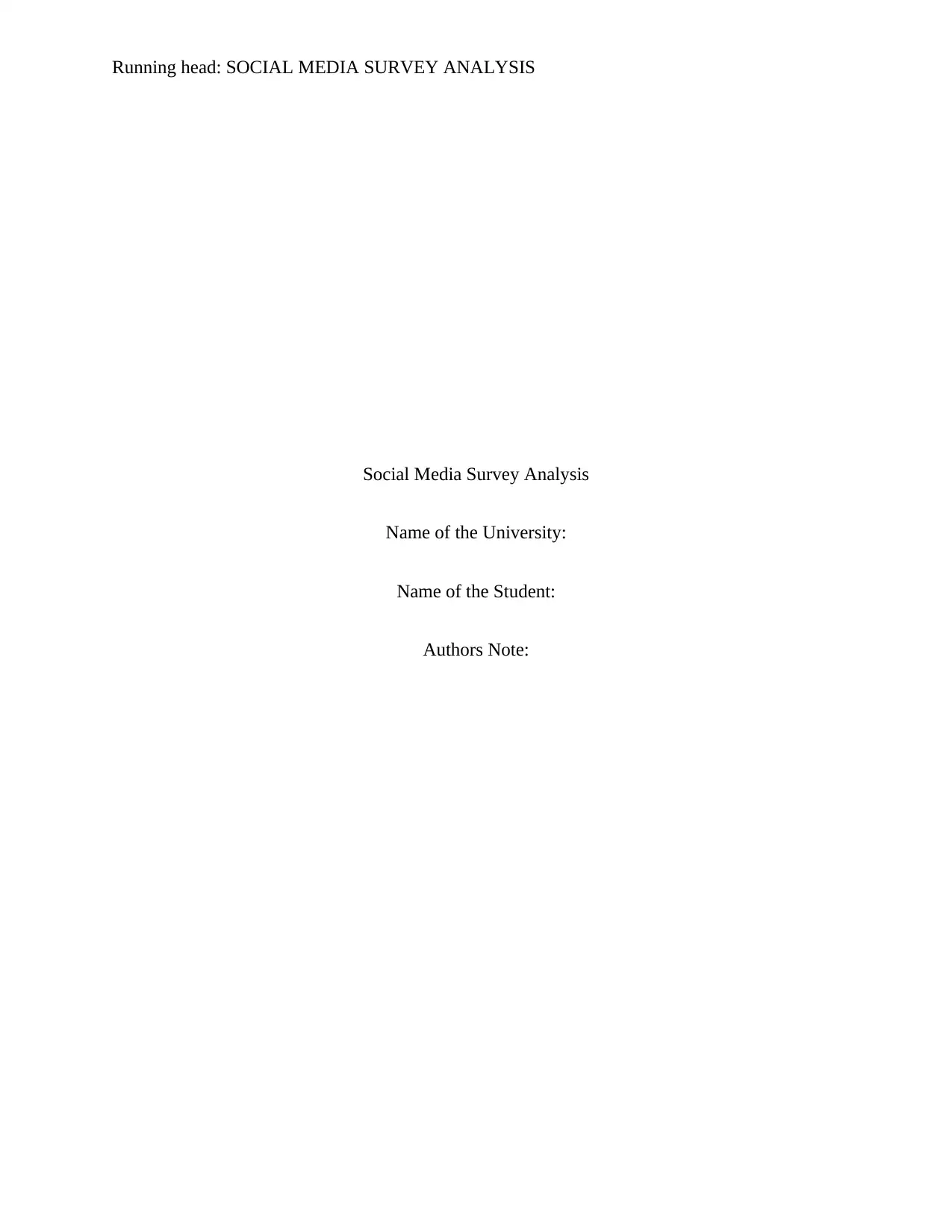
Running head: SOCIAL MEDIA SURVEY ANALYSIS
Social Media Survey Analysis
Name of the University:
Name of the Student:
Authors Note:
Social Media Survey Analysis
Name of the University:
Name of the Student:
Authors Note:
Paraphrase This Document
Need a fresh take? Get an instant paraphrase of this document with our AI Paraphraser
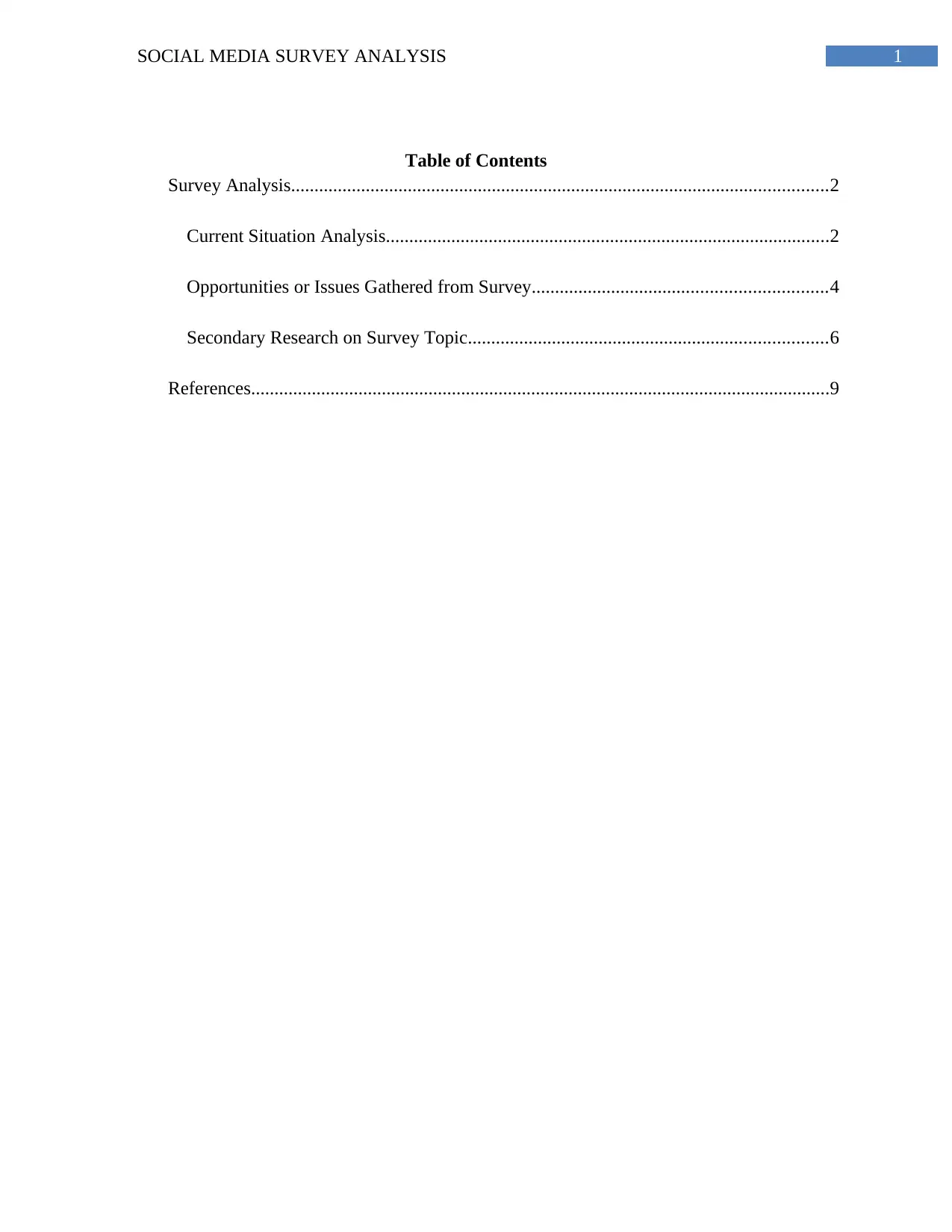
1SOCIAL MEDIA SURVEY ANALYSIS
Table of Contents
Survey Analysis...................................................................................................................2
Current Situation Analysis...............................................................................................2
Opportunities or Issues Gathered from Survey...............................................................4
Secondary Research on Survey Topic.............................................................................6
References............................................................................................................................9
Table of Contents
Survey Analysis...................................................................................................................2
Current Situation Analysis...............................................................................................2
Opportunities or Issues Gathered from Survey...............................................................4
Secondary Research on Survey Topic.............................................................................6
References............................................................................................................................9
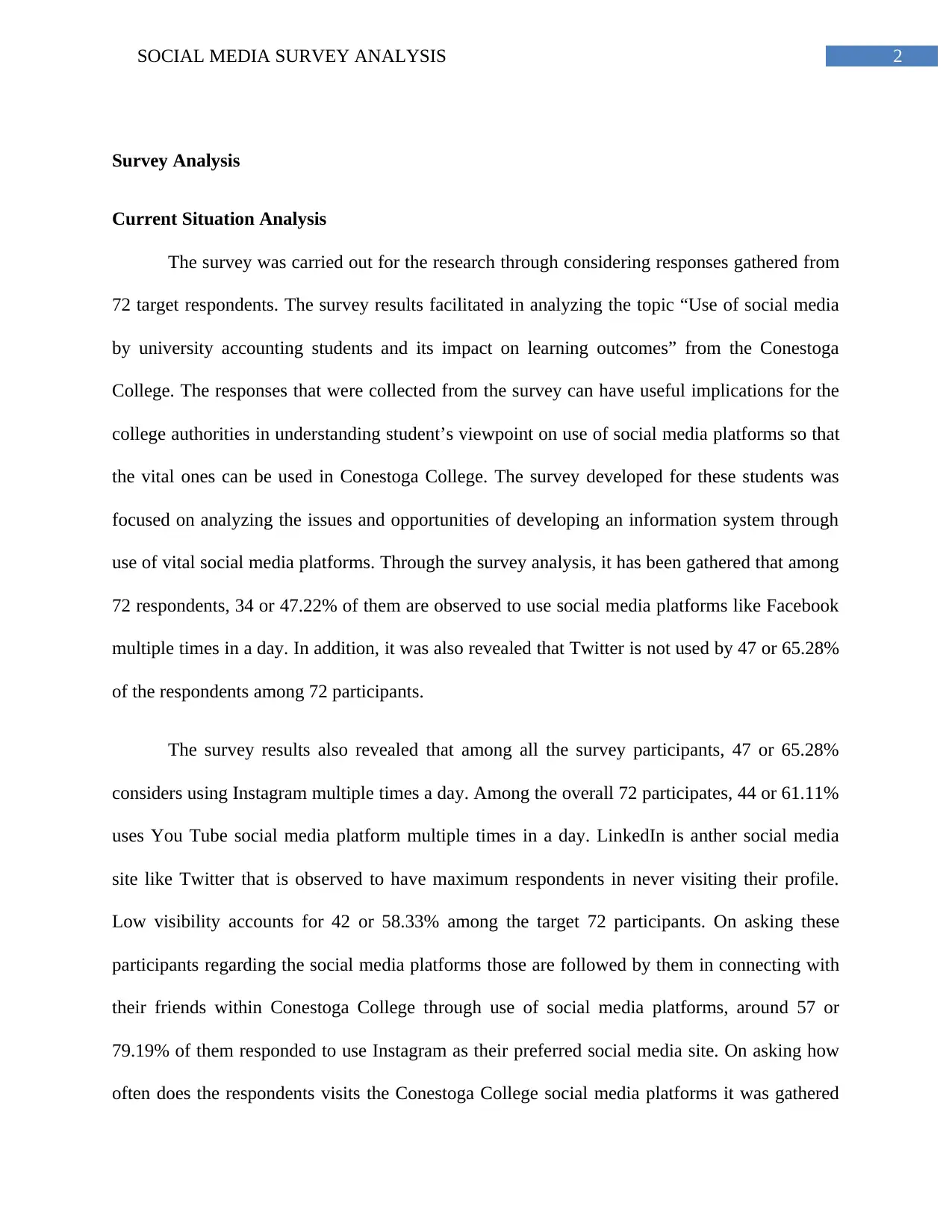
2SOCIAL MEDIA SURVEY ANALYSIS
Survey Analysis
Current Situation Analysis
The survey was carried out for the research through considering responses gathered from
72 target respondents. The survey results facilitated in analyzing the topic “Use of social media
by university accounting students and its impact on learning outcomes” from the Conestoga
College. The responses that were collected from the survey can have useful implications for the
college authorities in understanding student’s viewpoint on use of social media platforms so that
the vital ones can be used in Conestoga College. The survey developed for these students was
focused on analyzing the issues and opportunities of developing an information system through
use of vital social media platforms. Through the survey analysis, it has been gathered that among
72 respondents, 34 or 47.22% of them are observed to use social media platforms like Facebook
multiple times in a day. In addition, it was also revealed that Twitter is not used by 47 or 65.28%
of the respondents among 72 participants.
The survey results also revealed that among all the survey participants, 47 or 65.28%
considers using Instagram multiple times a day. Among the overall 72 participates, 44 or 61.11%
uses You Tube social media platform multiple times in a day. LinkedIn is anther social media
site like Twitter that is observed to have maximum respondents in never visiting their profile.
Low visibility accounts for 42 or 58.33% among the target 72 participants. On asking these
participants regarding the social media platforms those are followed by them in connecting with
their friends within Conestoga College through use of social media platforms, around 57 or
79.19% of them responded to use Instagram as their preferred social media site. On asking how
often does the respondents visits the Conestoga College social media platforms it was gathered
Survey Analysis
Current Situation Analysis
The survey was carried out for the research through considering responses gathered from
72 target respondents. The survey results facilitated in analyzing the topic “Use of social media
by university accounting students and its impact on learning outcomes” from the Conestoga
College. The responses that were collected from the survey can have useful implications for the
college authorities in understanding student’s viewpoint on use of social media platforms so that
the vital ones can be used in Conestoga College. The survey developed for these students was
focused on analyzing the issues and opportunities of developing an information system through
use of vital social media platforms. Through the survey analysis, it has been gathered that among
72 respondents, 34 or 47.22% of them are observed to use social media platforms like Facebook
multiple times in a day. In addition, it was also revealed that Twitter is not used by 47 or 65.28%
of the respondents among 72 participants.
The survey results also revealed that among all the survey participants, 47 or 65.28%
considers using Instagram multiple times a day. Among the overall 72 participates, 44 or 61.11%
uses You Tube social media platform multiple times in a day. LinkedIn is anther social media
site like Twitter that is observed to have maximum respondents in never visiting their profile.
Low visibility accounts for 42 or 58.33% among the target 72 participants. On asking these
participants regarding the social media platforms those are followed by them in connecting with
their friends within Conestoga College through use of social media platforms, around 57 or
79.19% of them responded to use Instagram as their preferred social media site. On asking how
often does the respondents visits the Conestoga College social media platforms it was gathered
⊘ This is a preview!⊘
Do you want full access?
Subscribe today to unlock all pages.

Trusted by 1+ million students worldwide
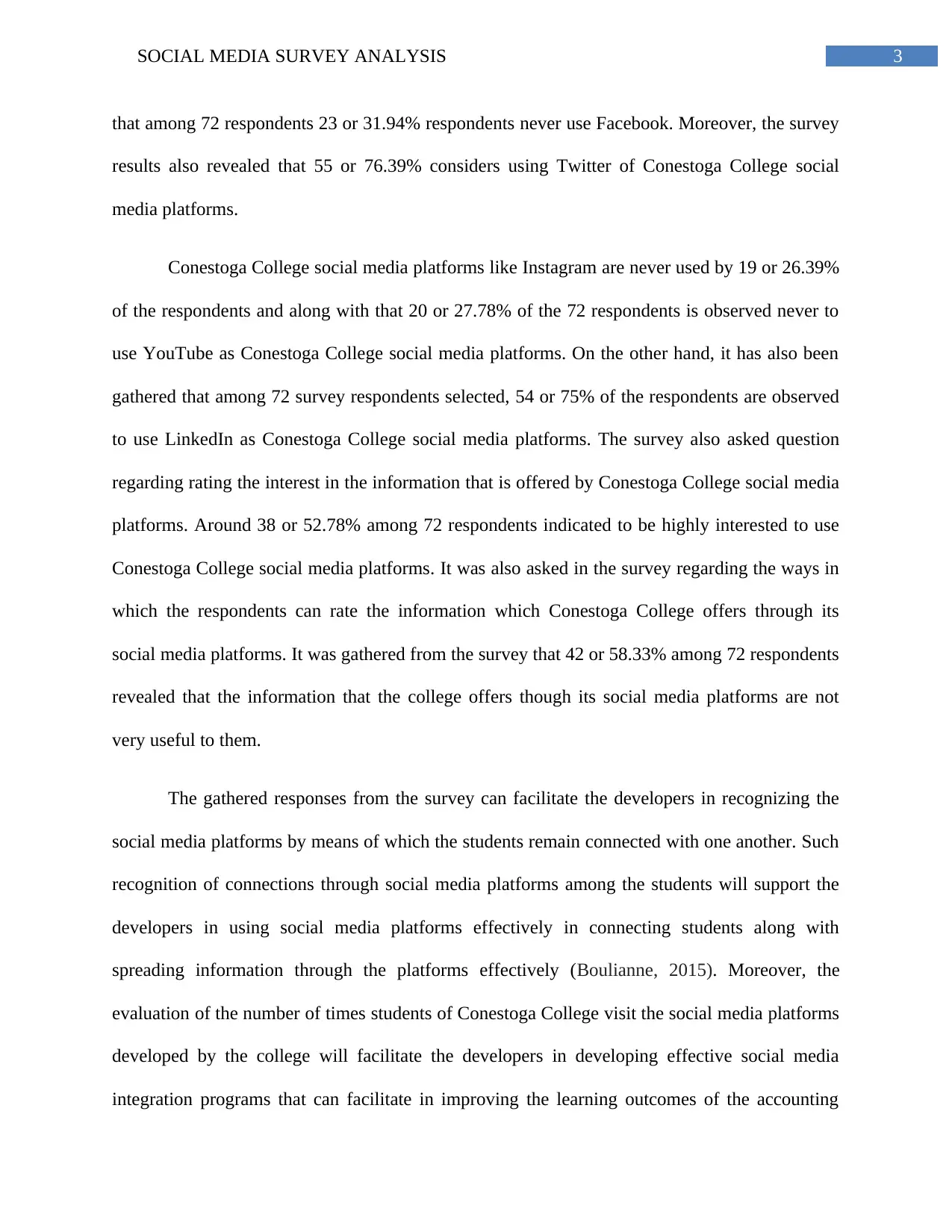
3SOCIAL MEDIA SURVEY ANALYSIS
that among 72 respondents 23 or 31.94% respondents never use Facebook. Moreover, the survey
results also revealed that 55 or 76.39% considers using Twitter of Conestoga College social
media platforms.
Conestoga College social media platforms like Instagram are never used by 19 or 26.39%
of the respondents and along with that 20 or 27.78% of the 72 respondents is observed never to
use YouTube as Conestoga College social media platforms. On the other hand, it has also been
gathered that among 72 survey respondents selected, 54 or 75% of the respondents are observed
to use LinkedIn as Conestoga College social media platforms. The survey also asked question
regarding rating the interest in the information that is offered by Conestoga College social media
platforms. Around 38 or 52.78% among 72 respondents indicated to be highly interested to use
Conestoga College social media platforms. It was also asked in the survey regarding the ways in
which the respondents can rate the information which Conestoga College offers through its
social media platforms. It was gathered from the survey that 42 or 58.33% among 72 respondents
revealed that the information that the college offers though its social media platforms are not
very useful to them.
The gathered responses from the survey can facilitate the developers in recognizing the
social media platforms by means of which the students remain connected with one another. Such
recognition of connections through social media platforms among the students will support the
developers in using social media platforms effectively in connecting students along with
spreading information through the platforms effectively (Boulianne, 2015). Moreover, the
evaluation of the number of times students of Conestoga College visit the social media platforms
developed by the college will facilitate the developers in developing effective social media
integration programs that can facilitate in improving the learning outcomes of the accounting
that among 72 respondents 23 or 31.94% respondents never use Facebook. Moreover, the survey
results also revealed that 55 or 76.39% considers using Twitter of Conestoga College social
media platforms.
Conestoga College social media platforms like Instagram are never used by 19 or 26.39%
of the respondents and along with that 20 or 27.78% of the 72 respondents is observed never to
use YouTube as Conestoga College social media platforms. On the other hand, it has also been
gathered that among 72 survey respondents selected, 54 or 75% of the respondents are observed
to use LinkedIn as Conestoga College social media platforms. The survey also asked question
regarding rating the interest in the information that is offered by Conestoga College social media
platforms. Around 38 or 52.78% among 72 respondents indicated to be highly interested to use
Conestoga College social media platforms. It was also asked in the survey regarding the ways in
which the respondents can rate the information which Conestoga College offers through its
social media platforms. It was gathered from the survey that 42 or 58.33% among 72 respondents
revealed that the information that the college offers though its social media platforms are not
very useful to them.
The gathered responses from the survey can facilitate the developers in recognizing the
social media platforms by means of which the students remain connected with one another. Such
recognition of connections through social media platforms among the students will support the
developers in using social media platforms effectively in connecting students along with
spreading information through the platforms effectively (Boulianne, 2015). Moreover, the
evaluation of the number of times students of Conestoga College visit the social media platforms
developed by the college will facilitate the developers in developing effective social media
integration programs that can facilitate in improving the learning outcomes of the accounting
Paraphrase This Document
Need a fresh take? Get an instant paraphrase of this document with our AI Paraphraser
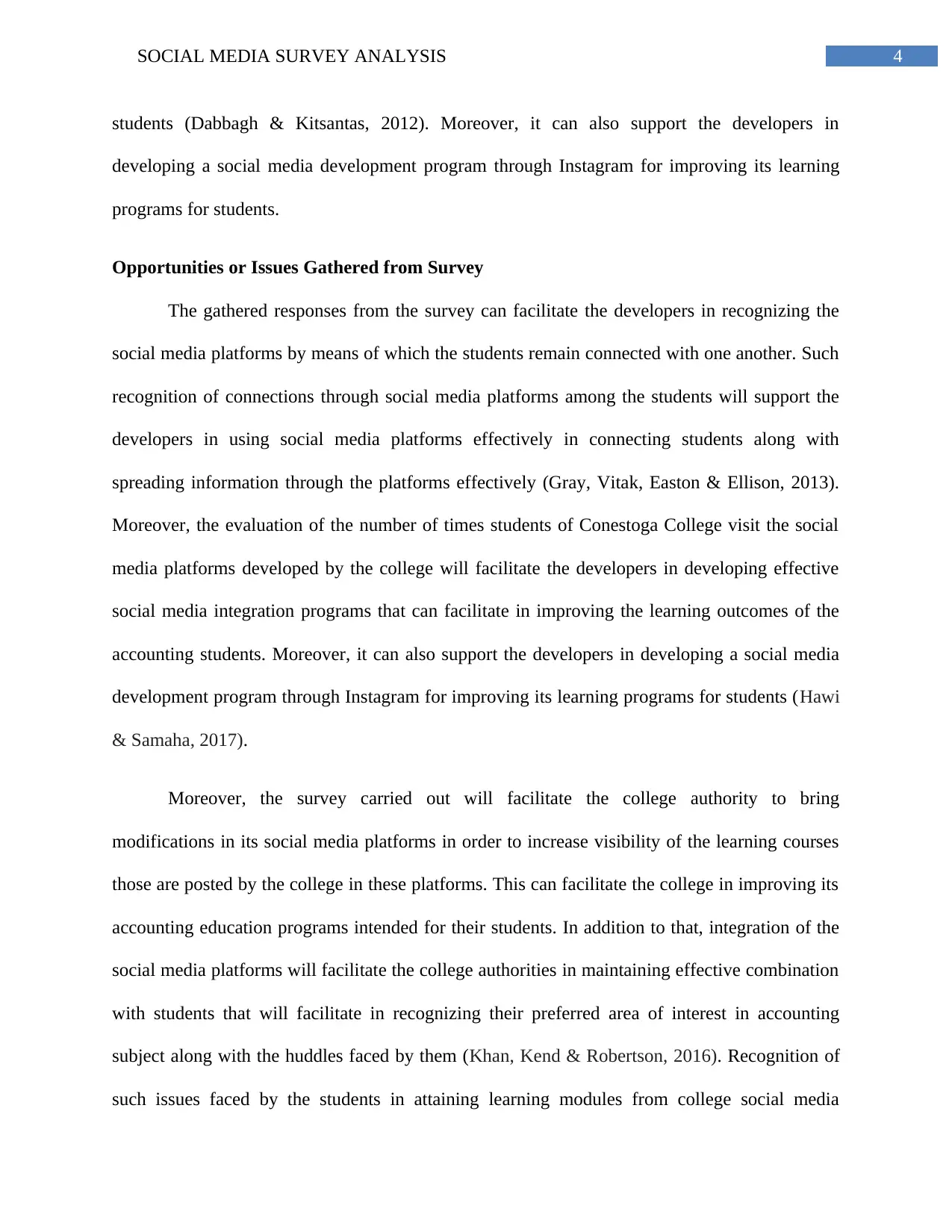
4SOCIAL MEDIA SURVEY ANALYSIS
students (Dabbagh & Kitsantas, 2012). Moreover, it can also support the developers in
developing a social media development program through Instagram for improving its learning
programs for students.
Opportunities or Issues Gathered from Survey
The gathered responses from the survey can facilitate the developers in recognizing the
social media platforms by means of which the students remain connected with one another. Such
recognition of connections through social media platforms among the students will support the
developers in using social media platforms effectively in connecting students along with
spreading information through the platforms effectively (Gray, Vitak, Easton & Ellison, 2013).
Moreover, the evaluation of the number of times students of Conestoga College visit the social
media platforms developed by the college will facilitate the developers in developing effective
social media integration programs that can facilitate in improving the learning outcomes of the
accounting students. Moreover, it can also support the developers in developing a social media
development program through Instagram for improving its learning programs for students (Hawi
& Samaha, 2017).
Moreover, the survey carried out will facilitate the college authority to bring
modifications in its social media platforms in order to increase visibility of the learning courses
those are posted by the college in these platforms. This can facilitate the college in improving its
accounting education programs intended for their students. In addition to that, integration of the
social media platforms will facilitate the college authorities in maintaining effective combination
with students that will facilitate in recognizing their preferred area of interest in accounting
subject along with the huddles faced by them (Khan, Kend & Robertson, 2016). Recognition of
such issues faced by the students in attaining learning modules from college social media
students (Dabbagh & Kitsantas, 2012). Moreover, it can also support the developers in
developing a social media development program through Instagram for improving its learning
programs for students.
Opportunities or Issues Gathered from Survey
The gathered responses from the survey can facilitate the developers in recognizing the
social media platforms by means of which the students remain connected with one another. Such
recognition of connections through social media platforms among the students will support the
developers in using social media platforms effectively in connecting students along with
spreading information through the platforms effectively (Gray, Vitak, Easton & Ellison, 2013).
Moreover, the evaluation of the number of times students of Conestoga College visit the social
media platforms developed by the college will facilitate the developers in developing effective
social media integration programs that can facilitate in improving the learning outcomes of the
accounting students. Moreover, it can also support the developers in developing a social media
development program through Instagram for improving its learning programs for students (Hawi
& Samaha, 2017).
Moreover, the survey carried out will facilitate the college authority to bring
modifications in its social media platforms in order to increase visibility of the learning courses
those are posted by the college in these platforms. This can facilitate the college in improving its
accounting education programs intended for their students. In addition to that, integration of the
social media platforms will facilitate the college authorities in maintaining effective combination
with students that will facilitate in recognizing their preferred area of interest in accounting
subject along with the huddles faced by them (Khan, Kend & Robertson, 2016). Recognition of
such issues faced by the students in attaining learning modules from college social media
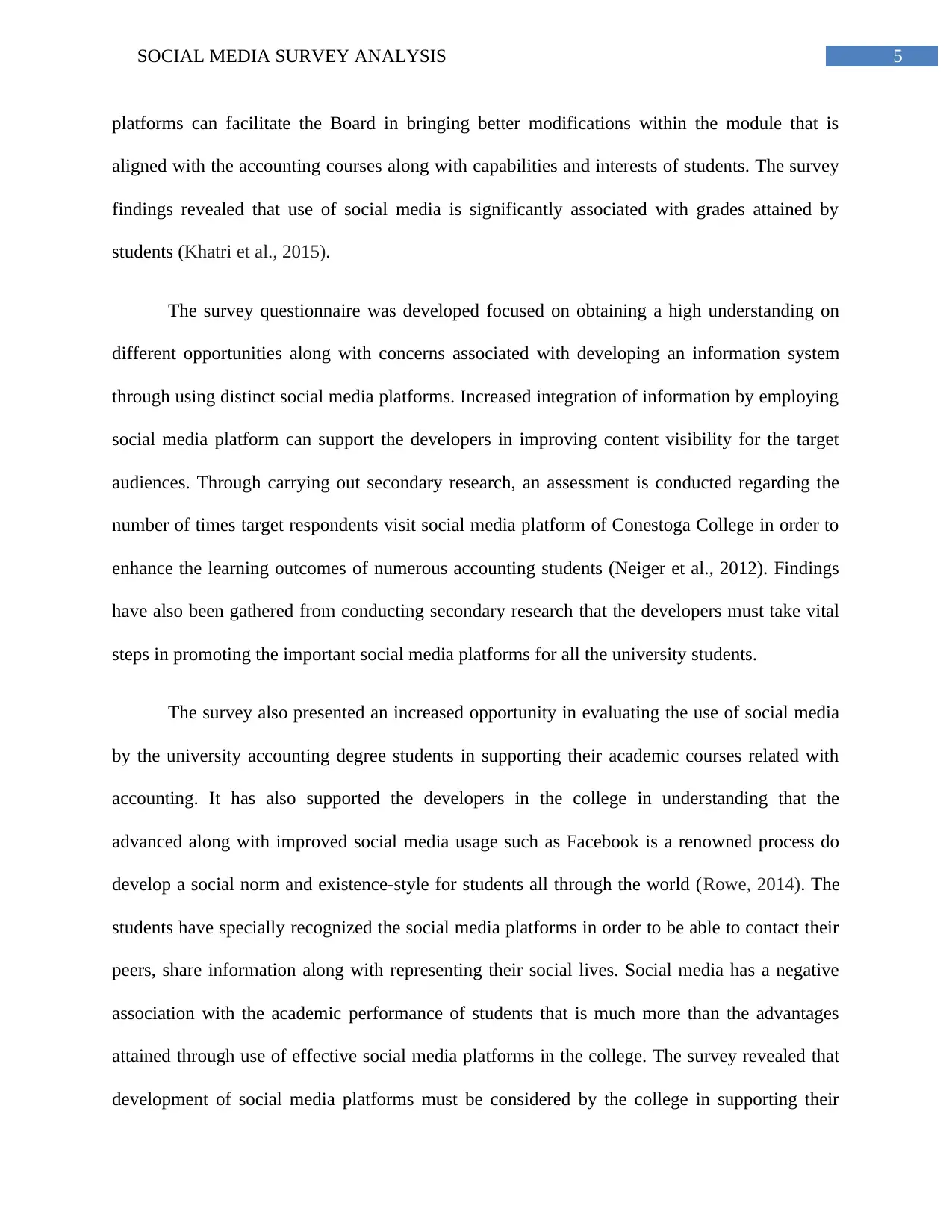
5SOCIAL MEDIA SURVEY ANALYSIS
platforms can facilitate the Board in bringing better modifications within the module that is
aligned with the accounting courses along with capabilities and interests of students. The survey
findings revealed that use of social media is significantly associated with grades attained by
students (Khatri et al., 2015).
The survey questionnaire was developed focused on obtaining a high understanding on
different opportunities along with concerns associated with developing an information system
through using distinct social media platforms. Increased integration of information by employing
social media platform can support the developers in improving content visibility for the target
audiences. Through carrying out secondary research, an assessment is conducted regarding the
number of times target respondents visit social media platform of Conestoga College in order to
enhance the learning outcomes of numerous accounting students (Neiger et al., 2012). Findings
have also been gathered from conducting secondary research that the developers must take vital
steps in promoting the important social media platforms for all the university students.
The survey also presented an increased opportunity in evaluating the use of social media
by the university accounting degree students in supporting their academic courses related with
accounting. It has also supported the developers in the college in understanding that the
advanced along with improved social media usage such as Facebook is a renowned process do
develop a social norm and existence-style for students all through the world (Rowe, 2014). The
students have specially recognized the social media platforms in order to be able to contact their
peers, share information along with representing their social lives. Social media has a negative
association with the academic performance of students that is much more than the advantages
attained through use of effective social media platforms in the college. The survey revealed that
development of social media platforms must be considered by the college in supporting their
platforms can facilitate the Board in bringing better modifications within the module that is
aligned with the accounting courses along with capabilities and interests of students. The survey
findings revealed that use of social media is significantly associated with grades attained by
students (Khatri et al., 2015).
The survey questionnaire was developed focused on obtaining a high understanding on
different opportunities along with concerns associated with developing an information system
through using distinct social media platforms. Increased integration of information by employing
social media platform can support the developers in improving content visibility for the target
audiences. Through carrying out secondary research, an assessment is conducted regarding the
number of times target respondents visit social media platform of Conestoga College in order to
enhance the learning outcomes of numerous accounting students (Neiger et al., 2012). Findings
have also been gathered from conducting secondary research that the developers must take vital
steps in promoting the important social media platforms for all the university students.
The survey also presented an increased opportunity in evaluating the use of social media
by the university accounting degree students in supporting their academic courses related with
accounting. It has also supported the developers in the college in understanding that the
advanced along with improved social media usage such as Facebook is a renowned process do
develop a social norm and existence-style for students all through the world (Rowe, 2014). The
students have specially recognized the social media platforms in order to be able to contact their
peers, share information along with representing their social lives. Social media has a negative
association with the academic performance of students that is much more than the advantages
attained through use of effective social media platforms in the college. The survey revealed that
development of social media platforms must be considered by the college in supporting their
⊘ This is a preview!⊘
Do you want full access?
Subscribe today to unlock all pages.

Trusted by 1+ million students worldwide
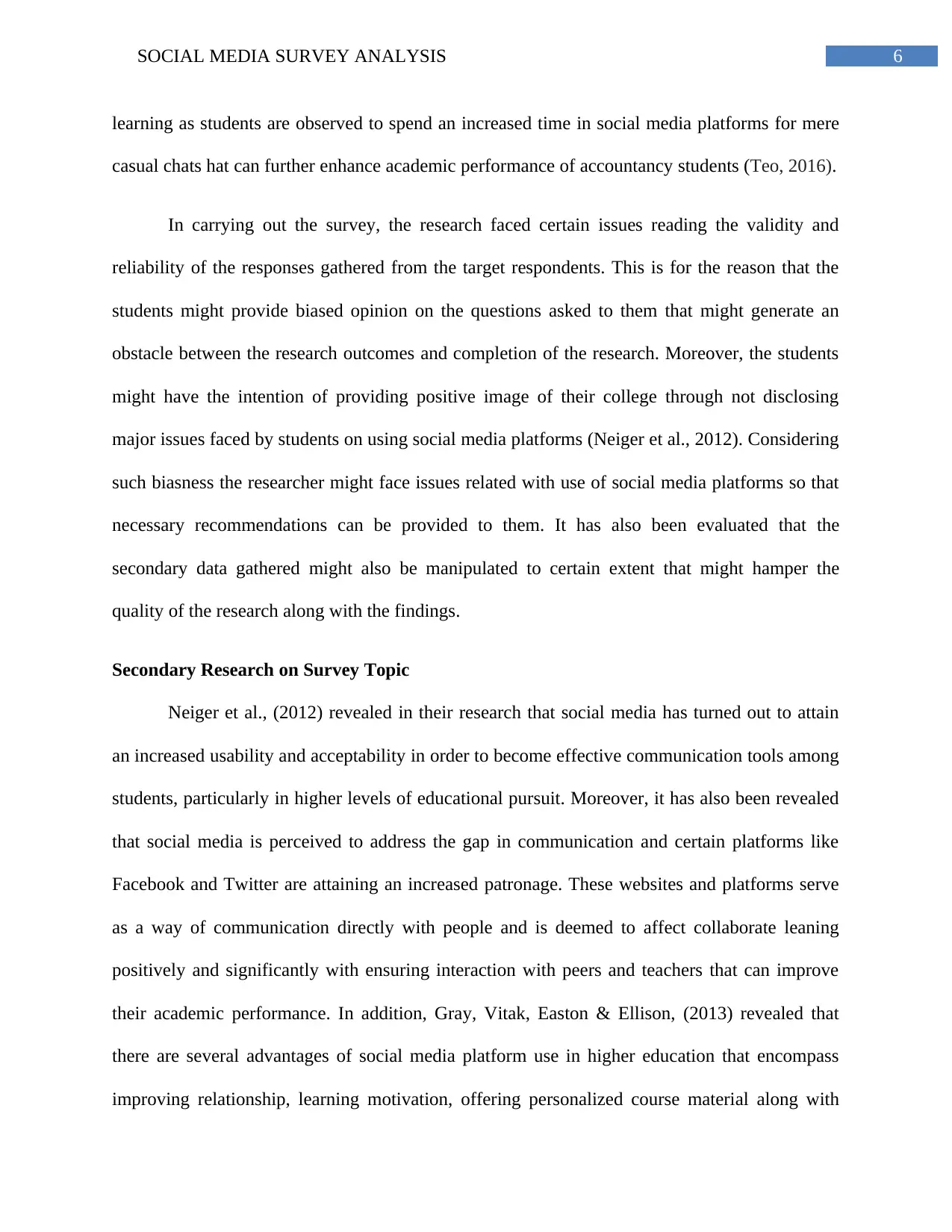
6SOCIAL MEDIA SURVEY ANALYSIS
learning as students are observed to spend an increased time in social media platforms for mere
casual chats hat can further enhance academic performance of accountancy students (Teo, 2016).
In carrying out the survey, the research faced certain issues reading the validity and
reliability of the responses gathered from the target respondents. This is for the reason that the
students might provide biased opinion on the questions asked to them that might generate an
obstacle between the research outcomes and completion of the research. Moreover, the students
might have the intention of providing positive image of their college through not disclosing
major issues faced by students on using social media platforms (Neiger et al., 2012). Considering
such biasness the researcher might face issues related with use of social media platforms so that
necessary recommendations can be provided to them. It has also been evaluated that the
secondary data gathered might also be manipulated to certain extent that might hamper the
quality of the research along with the findings.
Secondary Research on Survey Topic
Neiger et al., (2012) revealed in their research that social media has turned out to attain
an increased usability and acceptability in order to become effective communication tools among
students, particularly in higher levels of educational pursuit. Moreover, it has also been revealed
that social media is perceived to address the gap in communication and certain platforms like
Facebook and Twitter are attaining an increased patronage. These websites and platforms serve
as a way of communication directly with people and is deemed to affect collaborate leaning
positively and significantly with ensuring interaction with peers and teachers that can improve
their academic performance. In addition, Gray, Vitak, Easton & Ellison, (2013) revealed that
there are several advantages of social media platform use in higher education that encompass
improving relationship, learning motivation, offering personalized course material along with
learning as students are observed to spend an increased time in social media platforms for mere
casual chats hat can further enhance academic performance of accountancy students (Teo, 2016).
In carrying out the survey, the research faced certain issues reading the validity and
reliability of the responses gathered from the target respondents. This is for the reason that the
students might provide biased opinion on the questions asked to them that might generate an
obstacle between the research outcomes and completion of the research. Moreover, the students
might have the intention of providing positive image of their college through not disclosing
major issues faced by students on using social media platforms (Neiger et al., 2012). Considering
such biasness the researcher might face issues related with use of social media platforms so that
necessary recommendations can be provided to them. It has also been evaluated that the
secondary data gathered might also be manipulated to certain extent that might hamper the
quality of the research along with the findings.
Secondary Research on Survey Topic
Neiger et al., (2012) revealed in their research that social media has turned out to attain
an increased usability and acceptability in order to become effective communication tools among
students, particularly in higher levels of educational pursuit. Moreover, it has also been revealed
that social media is perceived to address the gap in communication and certain platforms like
Facebook and Twitter are attaining an increased patronage. These websites and platforms serve
as a way of communication directly with people and is deemed to affect collaborate leaning
positively and significantly with ensuring interaction with peers and teachers that can improve
their academic performance. In addition, Gray, Vitak, Easton & Ellison, (2013) revealed that
there are several advantages of social media platform use in higher education that encompass
improving relationship, learning motivation, offering personalized course material along with
Paraphrase This Document
Need a fresh take? Get an instant paraphrase of this document with our AI Paraphraser
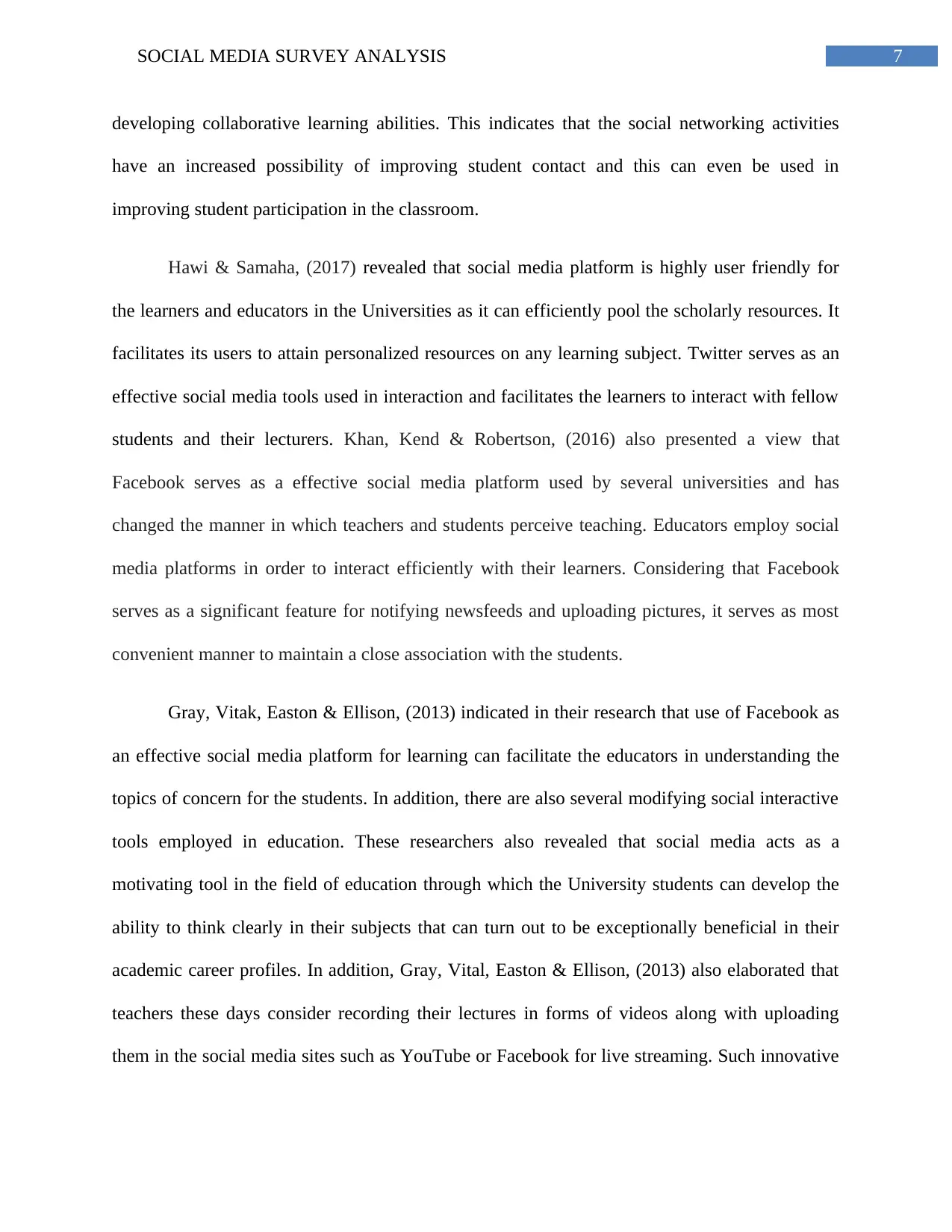
7SOCIAL MEDIA SURVEY ANALYSIS
developing collaborative learning abilities. This indicates that the social networking activities
have an increased possibility of improving student contact and this can even be used in
improving student participation in the classroom.
Hawi & Samaha, (2017) revealed that social media platform is highly user friendly for
the learners and educators in the Universities as it can efficiently pool the scholarly resources. It
facilitates its users to attain personalized resources on any learning subject. Twitter serves as an
effective social media tools used in interaction and facilitates the learners to interact with fellow
students and their lecturers. Khan, Kend & Robertson, (2016) also presented a view that
Facebook serves as a effective social media platform used by several universities and has
changed the manner in which teachers and students perceive teaching. Educators employ social
media platforms in order to interact efficiently with their learners. Considering that Facebook
serves as a significant feature for notifying newsfeeds and uploading pictures, it serves as most
convenient manner to maintain a close association with the students.
Gray, Vitak, Easton & Ellison, (2013) indicated in their research that use of Facebook as
an effective social media platform for learning can facilitate the educators in understanding the
topics of concern for the students. In addition, there are also several modifying social interactive
tools employed in education. These researchers also revealed that social media acts as a
motivating tool in the field of education through which the University students can develop the
ability to think clearly in their subjects that can turn out to be exceptionally beneficial in their
academic career profiles. In addition, Gray, Vital, Easton & Ellison, (2013) also elaborated that
teachers these days consider recording their lectures in forms of videos along with uploading
them in the social media sites such as YouTube or Facebook for live streaming. Such innovative
developing collaborative learning abilities. This indicates that the social networking activities
have an increased possibility of improving student contact and this can even be used in
improving student participation in the classroom.
Hawi & Samaha, (2017) revealed that social media platform is highly user friendly for
the learners and educators in the Universities as it can efficiently pool the scholarly resources. It
facilitates its users to attain personalized resources on any learning subject. Twitter serves as an
effective social media tools used in interaction and facilitates the learners to interact with fellow
students and their lecturers. Khan, Kend & Robertson, (2016) also presented a view that
Facebook serves as a effective social media platform used by several universities and has
changed the manner in which teachers and students perceive teaching. Educators employ social
media platforms in order to interact efficiently with their learners. Considering that Facebook
serves as a significant feature for notifying newsfeeds and uploading pictures, it serves as most
convenient manner to maintain a close association with the students.
Gray, Vitak, Easton & Ellison, (2013) indicated in their research that use of Facebook as
an effective social media platform for learning can facilitate the educators in understanding the
topics of concern for the students. In addition, there are also several modifying social interactive
tools employed in education. These researchers also revealed that social media acts as a
motivating tool in the field of education through which the University students can develop the
ability to think clearly in their subjects that can turn out to be exceptionally beneficial in their
academic career profiles. In addition, Gray, Vital, Easton & Ellison, (2013) also elaborated that
teachers these days consider recording their lectures in forms of videos along with uploading
them in the social media sites such as YouTube or Facebook for live streaming. Such innovative
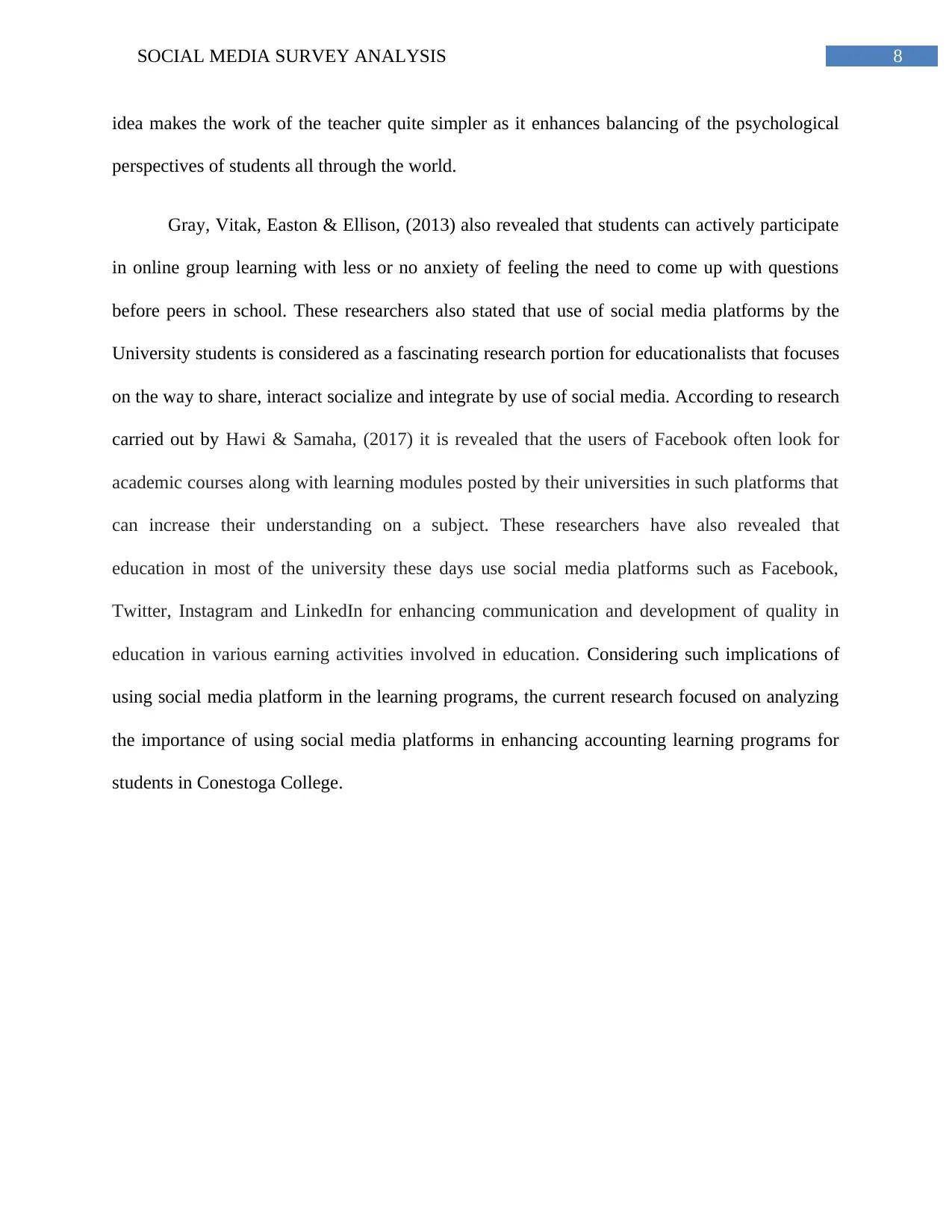
8SOCIAL MEDIA SURVEY ANALYSIS
idea makes the work of the teacher quite simpler as it enhances balancing of the psychological
perspectives of students all through the world.
Gray, Vitak, Easton & Ellison, (2013) also revealed that students can actively participate
in online group learning with less or no anxiety of feeling the need to come up with questions
before peers in school. These researchers also stated that use of social media platforms by the
University students is considered as a fascinating research portion for educationalists that focuses
on the way to share, interact socialize and integrate by use of social media. According to research
carried out by Hawi & Samaha, (2017) it is revealed that the users of Facebook often look for
academic courses along with learning modules posted by their universities in such platforms that
can increase their understanding on a subject. These researchers have also revealed that
education in most of the university these days use social media platforms such as Facebook,
Twitter, Instagram and LinkedIn for enhancing communication and development of quality in
education in various earning activities involved in education. Considering such implications of
using social media platform in the learning programs, the current research focused on analyzing
the importance of using social media platforms in enhancing accounting learning programs for
students in Conestoga College.
idea makes the work of the teacher quite simpler as it enhances balancing of the psychological
perspectives of students all through the world.
Gray, Vitak, Easton & Ellison, (2013) also revealed that students can actively participate
in online group learning with less or no anxiety of feeling the need to come up with questions
before peers in school. These researchers also stated that use of social media platforms by the
University students is considered as a fascinating research portion for educationalists that focuses
on the way to share, interact socialize and integrate by use of social media. According to research
carried out by Hawi & Samaha, (2017) it is revealed that the users of Facebook often look for
academic courses along with learning modules posted by their universities in such platforms that
can increase their understanding on a subject. These researchers have also revealed that
education in most of the university these days use social media platforms such as Facebook,
Twitter, Instagram and LinkedIn for enhancing communication and development of quality in
education in various earning activities involved in education. Considering such implications of
using social media platform in the learning programs, the current research focused on analyzing
the importance of using social media platforms in enhancing accounting learning programs for
students in Conestoga College.
⊘ This is a preview!⊘
Do you want full access?
Subscribe today to unlock all pages.

Trusted by 1+ million students worldwide
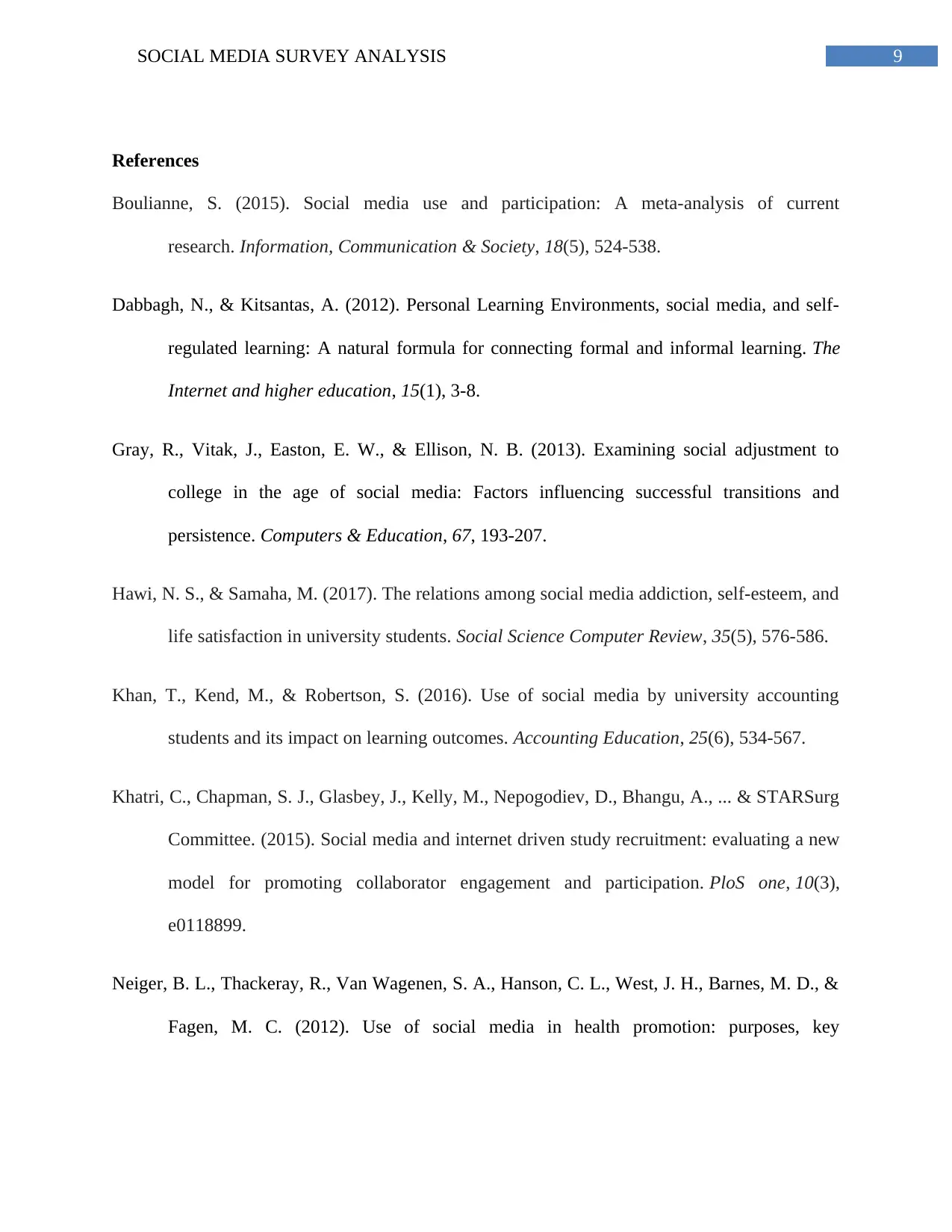
9SOCIAL MEDIA SURVEY ANALYSIS
References
Boulianne, S. (2015). Social media use and participation: A meta-analysis of current
research. Information, Communication & Society, 18(5), 524-538.
Dabbagh, N., & Kitsantas, A. (2012). Personal Learning Environments, social media, and self-
regulated learning: A natural formula for connecting formal and informal learning. The
Internet and higher education, 15(1), 3-8.
Gray, R., Vitak, J., Easton, E. W., & Ellison, N. B. (2013). Examining social adjustment to
college in the age of social media: Factors influencing successful transitions and
persistence. Computers & Education, 67, 193-207.
Hawi, N. S., & Samaha, M. (2017). The relations among social media addiction, self-esteem, and
life satisfaction in university students. Social Science Computer Review, 35(5), 576-586.
Khan, T., Kend, M., & Robertson, S. (2016). Use of social media by university accounting
students and its impact on learning outcomes. Accounting Education, 25(6), 534-567.
Khatri, C., Chapman, S. J., Glasbey, J., Kelly, M., Nepogodiev, D., Bhangu, A., ... & STARSurg
Committee. (2015). Social media and internet driven study recruitment: evaluating a new
model for promoting collaborator engagement and participation. PloS one, 10(3),
e0118899.
Neiger, B. L., Thackeray, R., Van Wagenen, S. A., Hanson, C. L., West, J. H., Barnes, M. D., &
Fagen, M. C. (2012). Use of social media in health promotion: purposes, key
References
Boulianne, S. (2015). Social media use and participation: A meta-analysis of current
research. Information, Communication & Society, 18(5), 524-538.
Dabbagh, N., & Kitsantas, A. (2012). Personal Learning Environments, social media, and self-
regulated learning: A natural formula for connecting formal and informal learning. The
Internet and higher education, 15(1), 3-8.
Gray, R., Vitak, J., Easton, E. W., & Ellison, N. B. (2013). Examining social adjustment to
college in the age of social media: Factors influencing successful transitions and
persistence. Computers & Education, 67, 193-207.
Hawi, N. S., & Samaha, M. (2017). The relations among social media addiction, self-esteem, and
life satisfaction in university students. Social Science Computer Review, 35(5), 576-586.
Khan, T., Kend, M., & Robertson, S. (2016). Use of social media by university accounting
students and its impact on learning outcomes. Accounting Education, 25(6), 534-567.
Khatri, C., Chapman, S. J., Glasbey, J., Kelly, M., Nepogodiev, D., Bhangu, A., ... & STARSurg
Committee. (2015). Social media and internet driven study recruitment: evaluating a new
model for promoting collaborator engagement and participation. PloS one, 10(3),
e0118899.
Neiger, B. L., Thackeray, R., Van Wagenen, S. A., Hanson, C. L., West, J. H., Barnes, M. D., &
Fagen, M. C. (2012). Use of social media in health promotion: purposes, key
Paraphrase This Document
Need a fresh take? Get an instant paraphrase of this document with our AI Paraphraser
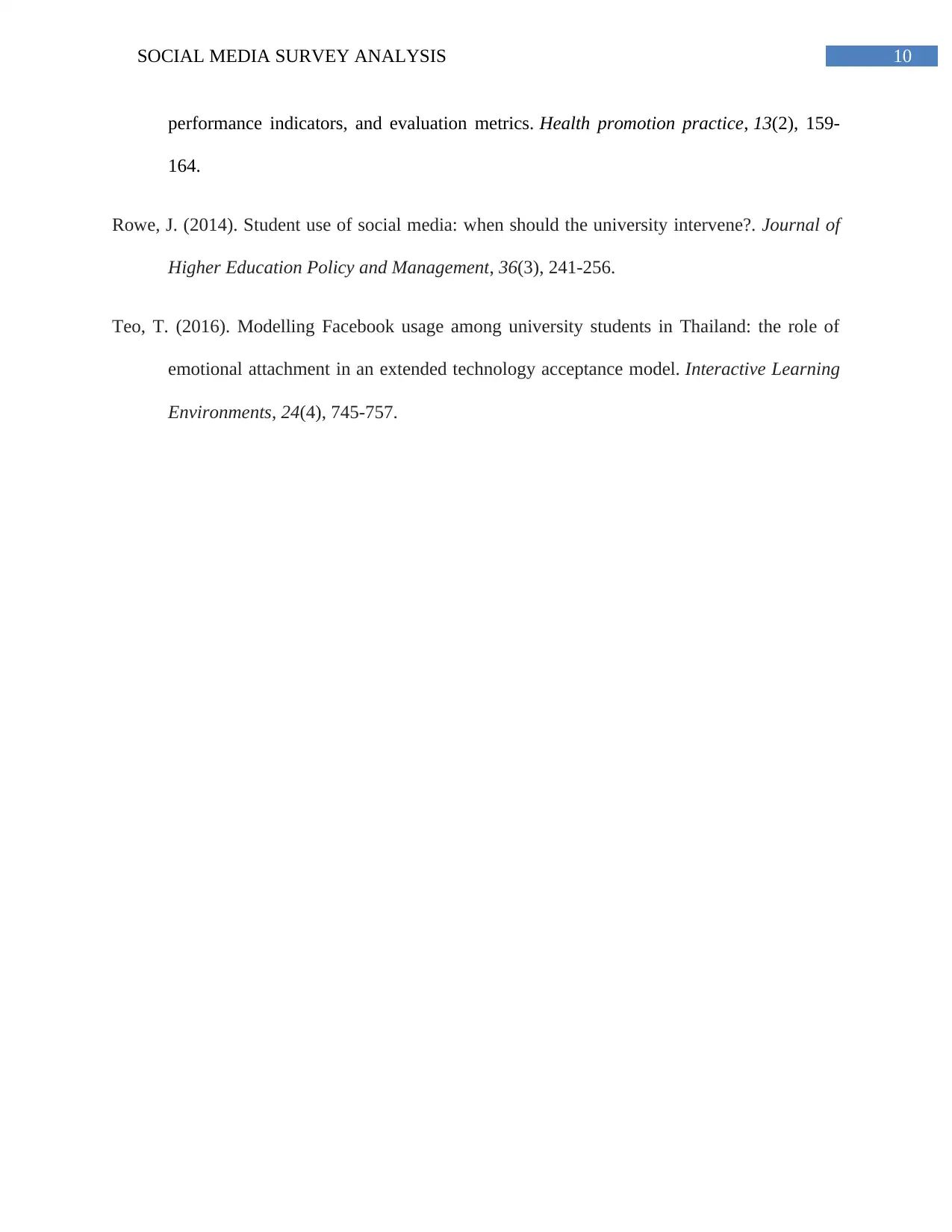
10SOCIAL MEDIA SURVEY ANALYSIS
performance indicators, and evaluation metrics. Health promotion practice, 13(2), 159-
164.
Rowe, J. (2014). Student use of social media: when should the university intervene?. Journal of
Higher Education Policy and Management, 36(3), 241-256.
Teo, T. (2016). Modelling Facebook usage among university students in Thailand: the role of
emotional attachment in an extended technology acceptance model. Interactive Learning
Environments, 24(4), 745-757.
performance indicators, and evaluation metrics. Health promotion practice, 13(2), 159-
164.
Rowe, J. (2014). Student use of social media: when should the university intervene?. Journal of
Higher Education Policy and Management, 36(3), 241-256.
Teo, T. (2016). Modelling Facebook usage among university students in Thailand: the role of
emotional attachment in an extended technology acceptance model. Interactive Learning
Environments, 24(4), 745-757.
1 out of 11
Related Documents
Your All-in-One AI-Powered Toolkit for Academic Success.
+13062052269
info@desklib.com
Available 24*7 on WhatsApp / Email
![[object Object]](/_next/static/media/star-bottom.7253800d.svg)
Unlock your academic potential
Copyright © 2020–2026 A2Z Services. All Rights Reserved. Developed and managed by ZUCOL.





